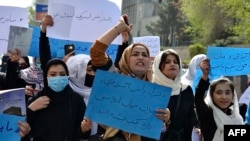A report by the World Economic Forum finds the COVID-19 pandemic has set back gender parity by a generation, and closing the gap after three years of economic disruption will take more than 100 years.
A survey of 146 countries found Iceland to be the most gender-equal country in the world and the only one to have closed more than 90 percent of the gender gap. The Global Gender Gap Report ranks countries according to their performance in health, education, economic participation and opportunity, and political empowerment.
Four Nordic countries are ranked among the top 10. Two African countries — 6th-place Rwanda and 8th-place Namibia — made the cut. The United States moved up three positions from last year to number 27 in the rankings. Holding up the bottom is Afghanistan.
World Economic Forum Managing Director Saadia Zahidi said women are disproportionately affected by the current cost of living crisis. That, she said, is largely due to loss of employment during the pandemic and the continued inadequacy of home care and child care infrastructure.
She said only the Nordic countries are doing well in that area.
"They have actually put systems in place that make it possible for care to be better distributed in families and also to find other solutions that are socially funded when it comes to care," Zahidi said. "That is one area that other governments would do well in investing in, and it truly is an investment because it pays off. It allows more women to go into the workforce."
She said it is important to remove basic barriers women encounter in accessing financial and digital services. Developing countries in particular will find that to be a huge issue if they want to be able to integrate more women into the labor force, she said.
Another barrier to achieving gender parity is education. Zahidi noted a lot of gender gaps in tertiary education either have been closed or are near closing in many parts of the world.
"But there are still too many persistent gaps when it comes to primary education and secondary education in many parts of the world. And that is critical," she said. "If we do not do that basic investment, then it is really impossible for those women to be able to go into higher paid, higher skilled professions into the future."
The report found North America is the best performing region in terms of reaching gender parity. At the current rate of change, it says that goal will be achieved in 59 years. Europe is closely behind and will close the gender gap in 60 years.
It says gender parity will be reached in 98 years in sub-Saharan Africa, while it will take nearly 200 years for women to achieve equality with men in South Asia, the region with the poorest record.










